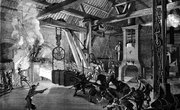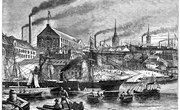The Industrial Revolution was a period of major reforms in the structure of manufacturing, agriculture and transportation, which led to the social and political structure of developed nations. This period, spanning about a century, from 1760 to 1850, saw initially Great Britain and then the developed nations of Europe and North America becoming industrialized. The number of factories increased, urbanization was on the rise and a new socioeconomic system was consolidated: capitalism.
Tip
The Industrial Revolution led to a rise in capitalism where means of production, such as factories, shops and farms, are privately owned and are used to make profit. Poor working conditions created a growing tension between capitalists and workers, which led to the rise of the labor movement and the appearance of the communist ideology.
How Capitalism Works
Capitalism is the economic system where means of production, such as factories, shops and farms, are privately owned and are used to make profit. The source of profit is the difference between the buying price of a commodity and its selling price after it has been processed. For example, a functional pair of scissors is worth more than two individual metal blades. In his most famous work, "Capital," German philosopher Karl Marx described the source of profit as the "exploitation of workers' labour surplus value," the extra value of processed goods that workers produce and capitalists earn.
Who Are the Capitalists?
Contrary to previous prevalent socioeconomic systems, including feudalism, there were no formal barriers on gaining wealth and prestige. Capitalists, the newly established elite of the industrialized society, came from diverse backgrounds: aristocratic environments, merchant families and even land owners, creating a class of their own. Issues of descent and origin played no role, as anyone who had sufficient initial capital and an investment plan could try their luck in the capitalist market.
Values of Capitalism
As political economist Adam Smith expressed in his work "The Wealth of Nations," capitalism is the "obvious and simple system of natural liberty." In theory, workers in capitalism are nobody's subject and have the freedom to work or not, while employment is seen as a form of transaction: money in exchange for productivity. In addition, people are free to seek profit and accumulate wealth with no limits. Competition in the capitalist market is another value based on natural liberties, even if success means the economic eradication of the other.
Social Effects
Land workers from rural areas moved to settlements around large factories, aiming to benefit from a regular job and the better wages of industrial jobs. However, working conditions at the eve of the Industrial Revolution were a far cry from today's decent wages in a 40-hour week and large numbers of full-time (seven days a week) workers had to squeeze into urban slums. Housing conditions in these unprecedentedly densely populated areas, such as the East End of London, did not improve until the early 20th century. Another effect of this new economic system was the growing tension between capitalists and workers, which led to the rise of the labor movement and the appearance of the communist ideology.
Related Articles
References
Writer Bio
Tasos Vossos has been a professional journalist since 2008. He has previously worked as a staff writer for "Eleftheros Tipos," a leading newspaper of Greece, and is currently a London-based sports reporter for Perform Sports Media in the United Kingdom. He holds a Bachelor of Arts in communication and media from the University of Athens.











